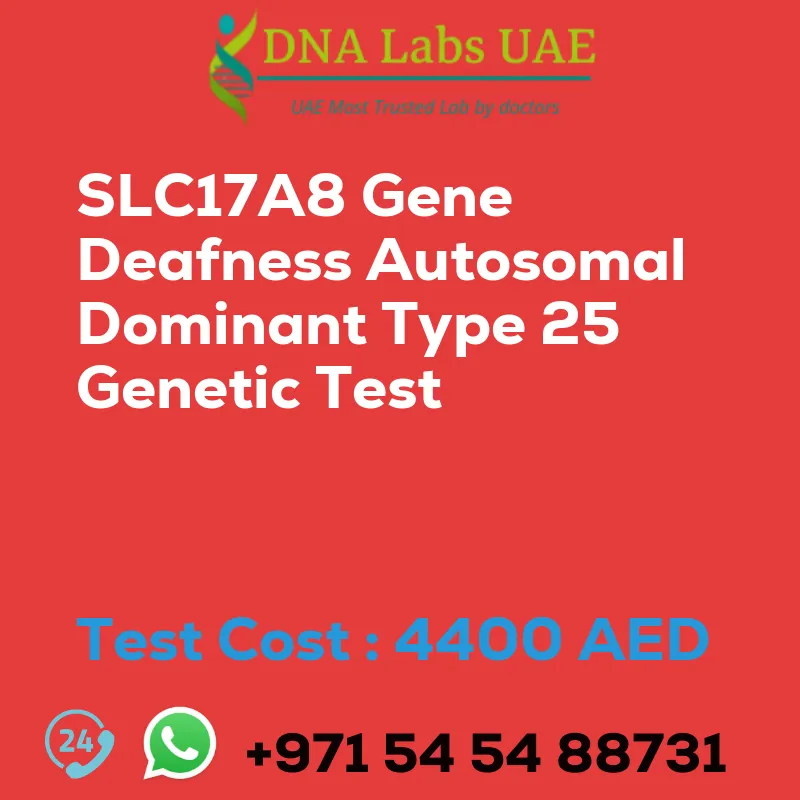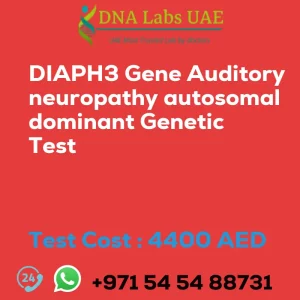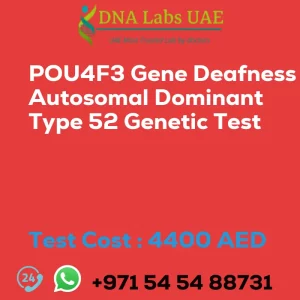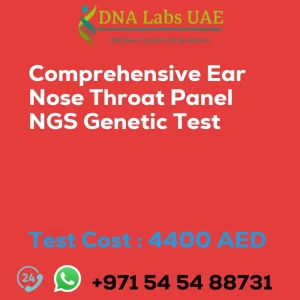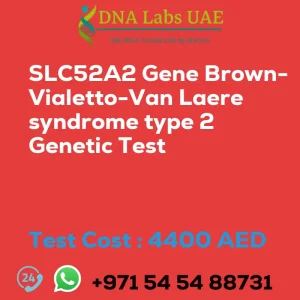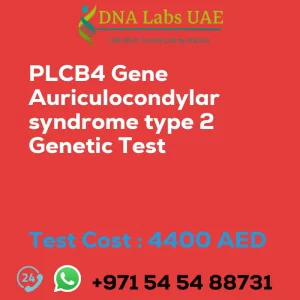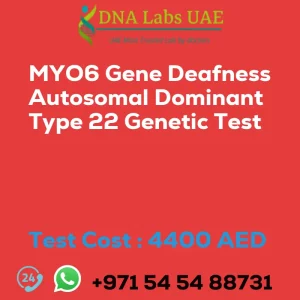SLC17A8 Gene Deafness autosomal dominant type 25 Genetic Test
At DNA Labs UAE, we offer the SLC17A8 Gene Deafness autosomal dominant type 25 Genetic Test at a cost of AED 4400.0.
Test Components
- Price: 4400.0 AED
- Sample Condition: Blood or Extracted DNA or One drop Blood on FTA Card
- Report Delivery: 3 to 4 Weeks
- Method: NGS Technology
- Test type: Ear Nose Throat Disorders
- Doctor: ENT Doctor
- Test Department: Genetics
Pre Test Information
If you are considering the IARS2 Gene Cataracts, growth hormone deficiency, sensory neuropathy, sensorineural hearing loss, and skeletal dysplasia NGS Genetic DNA Test, it is important to provide the clinical history of the patient. Additionally, a Genetic Counselling session will be conducted to draw a pedigree chart of family members affected with IARS2 Gene Cataracts, growth hormone deficiency, sensory neuropathy, sensorineural hearing loss, and skeletal dysplasia NGS Genetic DNA Test gene IARS4.
Test Details
The SLC17A8 gene is associated with a type of autosomal dominant deafness known as deafness type 25. This means that a person only needs to inherit one copy of the mutated gene from either parent to develop the condition. Our NGS (Next-Generation Sequencing) genetic testing uses advanced sequencing technologies to analyze multiple genes simultaneously. In the case of deafness type 25, our NGS genetic testing can identify mutations in the SLC17A8 gene that are responsible for the condition.
To perform the NGS genetic test for SLC17A8 gene deafness type 25, we will need a DNA sample from the individual undergoing testing. This can be obtained through a blood sample or a cheek swab. The DNA sample will then be sequenced using NGS technology to identify any mutations or variations in the SLC17A8 gene. The results of the NGS genetic test can help confirm a diagnosis of deafness type 25 and provide information about the specific mutation in the SLC17A8 gene.
This information can be valuable for genetic counseling, understanding the inheritance pattern, and potentially guiding treatment options or interventions for individuals affected by this condition.
| Test Name | SLC17A8 Gene Deafness autosomal dominant type 25 Genetic Test |
|---|---|
| Components | |
| Price | 4400.0 AED |
| Sample Condition | Blood or Extracted DNA or One drop Blood on FTA Card |
| Report Delivery | 3 to 4 Weeks |
| Method | NGS Technology |
| Test type | Ear Nose Throat Disorders |
| Doctor | ENT Doctor |
| Test Department: | Genetics |
| Pre Test Information | Clinical History of Patient who is going for IARS2 Gene Cataracts, growth hormone deficiency, sensory neuropathy, sensorineural hearing loss, and skeletal dysplasia NGS Genetic DNA Test. A Genetic Counselling session to draw a pedigree chart of family members affected with IARS2 Gene Cataracts, growth hormone deficiency, sensory neuropathy, sensorineural hearing loss, and skeletal dysplasia NGS Genetic DNA Test gene IARS4 |
| Test Details |
The SLC17A8 gene is associated with a type of autosomal dominant deafness known as deafness type 25. Autosomal dominant means that a person only needs to inherit one copy of the mutated gene from either parent to develop the condition. NGS (Next-Generation Sequencing) genetic testing is a type of genetic testing that uses advanced sequencing technologies to analyze multiple genes simultaneously. In the case of deafness type 25, NGS genetic testing can be used to identify mutations in the SLC17A8 gene that are responsible for the condition. The NGS genetic test for SLC17A8 gene deafness type 25 involves obtaining a DNA sample from the individual undergoing testing, usually through a blood sample or a cheek swab. The DNA sample is then sequenced using NGS technology to identify any mutations or variations in the SLC17A8 gene. The results of the NGS genetic test can help confirm a diagnosis of deafness type 25 and provide information about the specific mutation in the SLC17A8 gene. This information can be useful for genetic counseling, understanding the inheritance pattern, and potentially guiding treatment options or interventions for individuals affected by this condition. |

